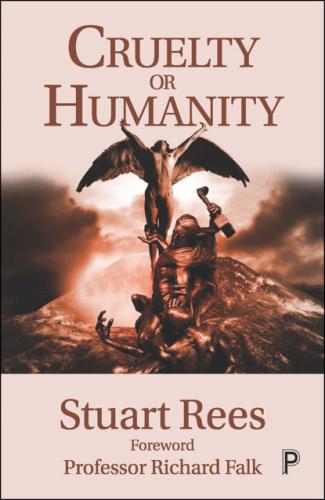Cruelty or Humanity. Rees, Stuart
servants, university managers, journalists, academics, business executives, the leaders of NGOs or even the organizers of writers’ festivals. Despite publicity about cruelties, their silence can be deafening.
This may sound like charges against those who act cruelly and those who stay passive because they want to get on with their lives. The charges should be made. This is also advocacy for humanitarianism to become centre stage in citizens’ thinking and actions, a humanitarianism characterized by creative, non-destructive exercise of power. Such conduct would include kindness, generosity, love and hospitality plus creativity in others’ interests, respect for all living things and for every individual’s dignity, as illustrated in all 30 clauses of the Universal Declaration of Human Rights. That last example emphasizes the universality of humanitarianism, across countries and cultures, even within the policies of diverse governments. That is the optimistic side of the argument, a healing story.
Such a story has been told by the late Stéphane Hessel, French resistance fighter, survivor of the Buchenwald concentration camp, a contributor to the committee which drafted the Universal Declaration of Human Rights and author of Time For Outrage (2010). In gratitude to Hessel, the first verse of Thanks to Stéphane says,
Thank you for your courage
in insisting on equality
by speaking as an ageless sage
on human needs for dignity:
‘Please never sit upon a fence,
your outrage makes a difference.’ 30
Outrage is never sufficient to end cruelties. The UN’s September 2017 condemnation of Aung San Suu Kyi’s silence over the killings and expulsion of Rohingyas had no effect on the Myanmar military’s attitudes and policies. UN resolutions condemning Israeli settlements as illegal appear to have been an incentive to build more settlements and to boast the irrelevance of international law.
Hessel insisted that if people were not outraged by injustice, they would lose touch with their own humanity.31 He appealed specifically to the younger generations to be outraged and involved, to challenge official denials of inhumanities.
Two names, Potemkin and Katyn, each related to Russian politics and policies, convey the significance of pretence and denial by governments. In 1787, in the government of the Empress Catherine, Minister Grigory Potemkin created fake villages in order to fool Catherine about a growing population. Whether or not the story is a myth, the point is that ‘Potemkin pretence’ appears to have grown as a principle of government.
In 1940, in the Polish Katyn Forest and surrounding areas, Soviet secret police, the NKVD, under Stalin’s orders, murdered 22,000 Polish nationals, mostly military officers and lower ranks. Until 1989, when President Gorbachev admitted Soviet responsibility for the atrocities, the Soviets had attributed the blame to the Nazis.
Pretence that all is well is a Potemkin phenomenon. Denial of atrocities is the Katyn practice that enables cruelties to proceed unhindered. As an elaboration of Potemkin/Katyn practices, George Orwell, in his depiction of ‘Newspeak’, reminded readers of the infinite capacity of powerful people to deceive even themselves.
In the March/April 2018 ‘March of Return’ protests staged by thousands of Gazans at the Israel/Gaza border, Israeli snipers killed over 100, many shot in the back. By December 2018, up to 200 had been killed, an estimated 20,000 were maimed, many made cripples for life.32
As part of an exercise in justifying virtues despite evidence to the contrary, an Israeli Defence Force (IDF) spokesperson said that his soldiers knew where their bullets went and he repeated the well-rehearsed claim that Israel had the most moral, the most humane army in the world.33
To highlight states’ reliance on duplicity and denial as a means of government, it is necessary to recall not only the claims of IDF personnel, those made by the regime of a Russian Empress or a Nazi dictatorship. Justification for the 2003 invasion of Iraq depended on US, British and Australian governments’ careful and vigorously presented deceit and denial. Referring to risks to London, British Prime Minister Tony Blair said that Iraq possessed and could dispatch weapons of mass destruction in 45 minutes. On both sides of the Atlantic, that claim was supported by dossiers riddled with lies, and with assertions about the benefits of regime change. The cruelties of the invading allies competed with the sadism of Saddam. A ‘Coalition of the Willing’, the US and its allies, invaded Iraq, destroyed the country, killed up to one million Iraqis and spawned the extremist Islamic force ISIS.
Official denials, often bare-faced lying, are just one of the dominant themes in accounts of cruelties. Individuals are stigmatized by being labelled unworthy or faceless, of little consequence, barely human. Asylum seekers are called illegals and potential terrorists. Reliance on force in domestic policies, in times of war and as a cue for state and non-state terrorists, gives rise to a chemistry of cruelty, each act as inventive and gruesome as the next.
Life-enhancing, health-promoting, non-violent alternatives to cruelty are cherished by citizens and can be promoted by politicians. Ideals for a common humanity can be formulated in the minds of politicians, civil servants, journalists and in states’ policies. Such ideals already occur in the visions of poets, in challenges from classical composers and through appeals by singers of songs of protest.
Конец ознакомительного фрагмента.
Текст предоставлен ООО «ЛитРес».
Прочитайте эту книгу целиком, купив полную легальную версию на ЛитРес.
Безопасно оплатить книгу можно банковской картой Visa, MasterCard, Maestro, со счета мобильного телефона, с платежного терминала, в салоне МТС или Связной, через PayPal, WebMoney, Яндекс.Деньги, QIWI Кошелек, бонусными картами или другим удобным Вам способом.
